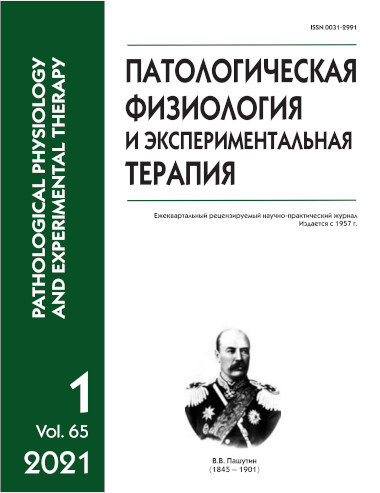Creatine benzyl ester is effective for prevention and treatment of neurological and cognitive disorders caused by focal cerebral ischemia in rats
Abstract
Background. Ischemic stroke is one of the main causes for premature death worldwide. Cognitive and functional disorders induced by stroke result in disability. Currently, only one agent has been approved for the clinical use, recombinant plasminogen activator, which provides recovery (recanalization) of cerebral blood flow. Despite numerous studies, an effective treatment to protect directly neurons from ischemia (preventing apoptosis, maintaining functional activity) has not been found so far. Thus, search for new approaches to prevention and treatment of acute cerebrovascular accidents remains one of the most pressing challenges of modern medicine. The aim of this work was to study the effect of creatine benzyl ester, a new synthetic compound capable for penetrating the blood-brain barrier to provide neuroprotection, on neurological and cognitive disorders induced by focal cerebral ischemia in Sprague-Dawley rats. Methods. Focal cerebral ischemia was induced by chronic occlusion of the left middle cerebral artery (MCA) by a A. Tamura et al. (1981) modified method. Combined intraperitoneal (i.p.) anesthesia with Zoletil/Domitor (50 mg/kg and 0.2 mg/kg, respectively) was used. Body temperature was maintained at 38±0.5 °C. MCA occlusion was performed by bipolar high-frequency electrocoagulation (EKVCh-25-11-C, Media, Russia) of the most proximal part of the artery, from 0.5 mm from the place where it originates from the circle of Willis and over 2–3 mm. The sham ischemia procedure was similar to that described above but without MCA electrocoagulation. Severity of neurological disorders was assessed with the Garcia neurological scale and a modified scale for severity of neurological disorders (OTTN) one day before and at 1, 3, and 7 days following ischemia. Cognitive impairment was assessed with the Morris water maze, a standard test for learning and memory. This test was used in a version for studying spatial reference memory, which consists of finding a platform hidden under the water by the animal guided only by surrounding marks. Creatine benzyl ester was injected i.p. three times, 3, 2 and 1 h before focal ischemia for prevention or 1, 2 and 3 h after ischemia for treatment. Results. The study produced priority data showing that preventive administration of creatine benzyl ester effectively abolished the development of neurological disorders and alleviated the cognitive impairment after focal cerebral ischemia whereas the therapeutic treatment restricted the severity of neurological and cognitive disorders. Conclusion. The results of the study supported recommendation of this creatine derivative (after assessing potential toxicity) for the first phase of clinical trials as an anti-ischemic drug.






